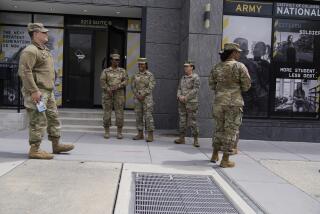Is China Army Going Out of Business?
- Share via
WASHINGTON — It almost sounds like a Jay Leno routine.
Imagine if the Pentagon started manufacturing refrigerators, running breweries, building hotels and smuggling cars as a way of making money for its budget.
In China, this is not a joke. It has been the reality for most of the last two decades. The Chinese People’s Liberation Army, the world’s biggest military force, in the 1980s began operating an array of civilian business enterprises big and small. The PLA became by far the most important business conglomerate in China.
Now, a book by China expert James Mulvenon, “Soldiers of Fortune,” presents the first scholarly look at the Chinese army and its extensive moneymaking operations.
It is a damning portrait. Mulvenon shows that the Chinese military, under Defense Minister Chi Haotian, exploited its resources and its political clout for commercial advantage. It used military trucks and trains for free transport, employed soldiers for cheap labor and evaded taxes and duties that competitors had to pay.
The system became so inherently corrupting that, in 1998, Chinese President Jiang Zemin ordered the military to divest itself of these businesses.
China is not the only country that has had a commercial army. A study in Jane’s Defense Weekly shows that in several other Asian and Latin American countries--Indonesia, Pakistan, Vietnam, Ecuador, Honduras and Peru--armies have launched business enterprises.
But as Jane’s points out, when it comes to doing business, the Chinese army has been the world’s trailblazer.
The commercial operations have deep roots in the history of the Chinese Communist Party. While it was fighting the civil war against the Nationalists, the People’s Liberation Army supported itself by running factories and farms.
It also apparently grew and sold opium for profit, with the covert approval of Mao Tse-tung. Mulvenon cites evidence showing that in the early 1940s a military unit called the Daguang Soap Factory served as a front for opium trade.
The modern version of “PLA Inc.” dates to the early 1980s. After Mao died, his successor, Deng Xiaoping, decided to focus on economic modernization and to keep a tight rein on defense spending.
In 1984, Deng told army leaders they should start using military facilities and resources to boost civilian production. That order opened the door. Within a couple of years, the military was making money by selling everything from shoes to missiles.
Over the next 14 years, the army developed into what Mulvenon calls a “multibillion-dollar international business empire.” Finally, three years ago, after a series of huge smuggling scandals, China’s leaders called for an end to the army’s commercialism.
Has it really stopped? It’s not clear yet the extent to which the army is complying. There are signs of change. China’s customs collections suddenly shot up last year by 41%, an increase of roughly $8 billion, apparently because the army cut back on the business of smuggling.
But Mulvenon points out that the Chinese leadership gave the army a special exception allowing the PLA to keep on doing business in telecommunications.
And he predicts that over the next few years there will be “repeated ‘mop-up’ campaigns on the part of the central leadership [to get the army to divest its businesses] and significant resistance and foot-dragging on the part of local military officials.”
If the Chinese army does in fact give up its business endeavors, that may not be such a good thing for the United States or for China’s neighbors in Asia. In a way, the PLA’s venture into entrepreneurship has served as a distraction, diverting it from more traditional military tasks.
Another recent study shows that as the Chinese army is getting out of commerce, China’s national security strategy and world view seem to be changing.
In 1984, Deng declared that the world was moving from a time of war and revolution into an era of “peace and development.” That judgment gave the Chinese army a more relaxed view of its mission.
But in 1999, following the NATO intervention in Kosovo, China began to reexamine Deng’s assumptions. The change is described in a report, “China Reconsiders Its National Security Strategy,” by David M. Finkelstein of the CNA Corp., a military think tank.
He concludes that after a debate Chinese leaders came up with a new, less optimistic assessment: While peace and development will largely continue, there is a new trend toward military intervention around the world, spurred on above all by the United States.
Put together, these two studies show that the Chinese military is getting reinvigorated at just the time when China is becoming more wary of the U.S.
“In a sense, we [the United States] had it pretty good for years,” Mulvenon, who now works at the Rand Corp., said in an interview. “As long as the PLA was running hotels and bars and things, they weren’t focused on professionalization.
“What we see now, in essence, is a military that’s getting its act together.”
*
Jim Mann’s column appears in this space every Wednesday.
More to Read
Sign up for Essential California
The most important California stories and recommendations in your inbox every morning.
You may occasionally receive promotional content from the Los Angeles Times.













